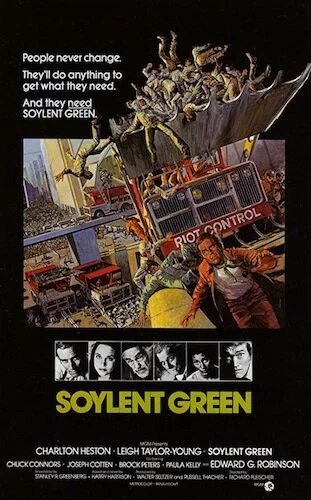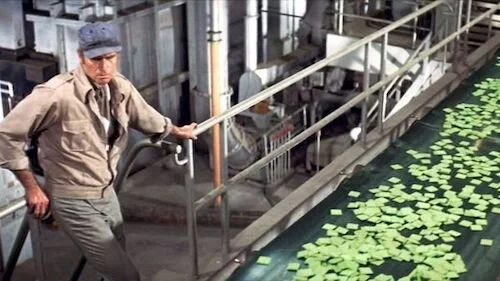Soylent Green: On-This-Day Thursday
Every Thursday, an older film released on this opening weekend years ago will be reviewed. They can be classics, or simply popular films that happened to be released to the world on the same date.
For April 19th, we are going to have a look at Soylent Green.
I’m super torn with this cult classic. On one hand, Soylent Green is full of the wow-factor that a politically charged film should contain, especially when it comes to that twist. In case you don’t know what the twist is, I will not mention a word. Although, I will say you are incredibly lucky if you have yet to be spoiled. Soylent Green is up there with The Sixth Sense, The Empire Strikes Back, and Rosemary’s Baby as being the most spoiled films throughout all of cinematic history. In case you couldn’t tell, Richard Fleischer’s apocalyptic sci-fi is definitely anchored almost entirely around its twist ending, which can only mean two things. Firstly, you’re guaranteed to be punched in the stomach by what you don’t see coming (or did foresee, and only wished to be wrong about). Secondly, the film completely collapses on subsequent viewings, because it has served its purpose, and revisiting it will not capture the same spark.
That’s the other hand. You get what Fleischer is saying about society — for the most part — right away. Everything is grey or rusty olive. Mobs of people are usually crowding the streets. If there isn’t a mass panic, then all is a dull drone. Detective Thorn (Charlton Heston) is the outlier here, in typical film noir fashion. You are there alongside him to try and pick out the cause for the assassination of William R. Simonson: an influential executive for Soylent Industries. Around the time of release (1973), the New Hollywood movement was heavily ripping into the power of corporations, likely as a rebellion against the industry they were a small piece of and had to answer to themselves. Soylent Green wasn’t the only film that tried to create such a societal fuss. In many ways, it’s up there with a number of other prophetic sci-fi works (1984, Metropolis, the Mad Max series). We have a society hell bent around mass hysteria, companies that don’t value people, and a concern for overpopulation, economic favouritism, and the healthiness of what we consume. We are sheeple. It’s already too late for that to not be the case.
There’s the infamous green stuff.
As wise as Soylent Green is as a precaution, once again, it is all too reliant on the one iconic line that is meant to cause a rippling series of fears throughout your entire body. Could it really come to this? Firstly, I hope not. Secondly, it’s the kind of twist that isn’t lazy in nature, but the film surrounding it is completely indebted to it. Maybe if this twist happened earlier on, and Thorn had subsequent realizations (or we just had time to ingest this revelation within the film’s runtime for longer), Soylent Green would have an even bigger impact as an actual narrative. As a statement, Soylent Green is stellar. As a film, it crumbles. Of course, that may have been Fleischer’s entire point when adapting Harry Harrison’s novel Make Room! Make Room!. He heard a message that needed to be witnessed by the masses, and the film underneath it didn’t quite matter, as long as the response was large.
So, with that I say this. There’s a reason why Soylent Green is taught in classes, and continuously discussed today. It’s because of what the film had to say. It may be an important film, but that doesn’t make it an excellent film, necessarily. Still, its nobility rings true, and its cult following thrives for this very reason. Without spoiling, I will admit this. The twist is shocking, but it remains a sentence with double meanings. The second is that we are the disease of the world, and why so much has gone wrong. It’s profound. It’s been said before. It’s relevant. Still, that first watch of Soylent Green, when it was still a film yet to be tested by its own foundations, is quite spooky, in the kind of way that life around you changes significantly. Well, it’s also 2020. We’re well aware of the world’s gargantuan woes by now.
Andreas Babiolakis has a Masters degree in Film and Photography Preservation and Collections management from Ryerson University, as well as a Bachelors degree in Cinema Studies from York University. His favourite times of year are the Criterion Collection flash sales and the annual Toronto International Film Festival.





